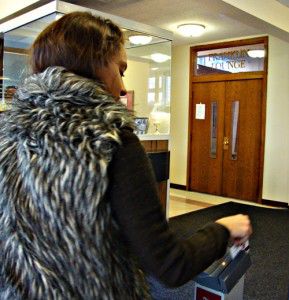
Student Union has set plans to create study spaces that would include Boston University students living off-campus, who otherwise cannot access most study lounges in residence halls.
Alisha Tubis, president of the Off-Campus Council, said Union will work with faculty and the Facilities, Management & Planning to find locations to convert into study spaces, as well as improving current spaces to include necessities such as printing.
“There is currently an overwhelming support for the initiative as this necessary space is not being provided,” said Tubis, a Sargent College of Health and Rehabilitation Sciences junior, in an email interview.
The initiative does not include working toward 24-hour access to residence hall study rooms, said Union Vice President Alex Staikos. Instead, Union will focus on providing access to a space that on- and off-campus students can share.
“Since the beginning, our approach has not been to allow off-campus students unlimited access to on-campus housing,” said Staikos, a School of Management sophomore, in an email interview. “Rather, we see a supply issue in dealing with the demands of students for reserved team collaboration spaces.”
Staikos said Union’s possible solutions include dormitory study space for all students, a separate facility similar to the 24-hour computer space that opened on Cummington a few years ago, or additional specific reservation-only rooms similar to the team rooms in SMG.
While opening the dorm study spaces is the most cost-efficient solution, Staikos said it also raises a number of concerns, including possible overcrowding, usage agreements and security concerns for residents.
“The question of who should then pay for these facilities is also raised, if it is not only residents that can use them,” he said.
SAR junior Eva O’Brien, who transferred to BU from George Washington University, said the restrictions on off-campus students in residence halls made the transition more difficult.
“I actually am very frustrated with the fact that I cannot utilize the study room space or meet my friends in dorm common areas,” O’Brien said via email.
At GWU, O’Brien said students only needed to sign into freshmen dorms. Guards watched upperclassmen dorms at night, but required no sign-in process for residences’ guests.
“I believe that BU undergrad students should be able to swipe into upperclassmen residence halls or not have swipe access but at least not have to sign in,” O’Brien said.
O’Brien suggested implementing the change on weekdays, at least on a trial basis.
Cicely Morris, a College of Arts and Sciences senior, said the lack of study spaces beyond West Campus and near Allston have not caused a problem, but late-night transportation does.
“There have definitely been times, especially during exams, where it’s been a huge hassle to go to and from the library to study,” Morris said via email. “Not only is it far away and gets super crowded, but if you stay past 1 [a.m.] you have to walk home.
“Having a 24-hour place to study would be great, even if it was just opened for the end of the semester.”
The success of the initiative, however, may depend on how students respond, Tubis said.
“It is important that the BU community continues to show [its] support for the initiative and continues to work toward the necessary changes,” she said.
This is an account occasionally used by the Daily Free Press editors to post archived posts from previous iterations of the site or otherwise for special circumstance publications. See authorship info on the byline at the top of the page.



